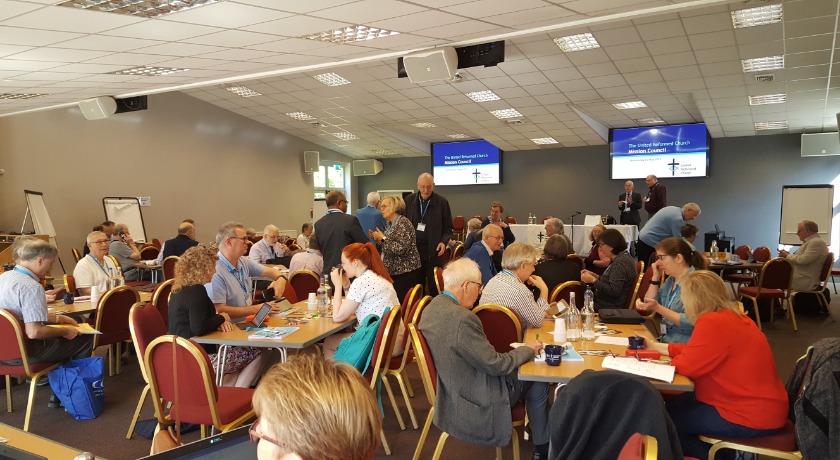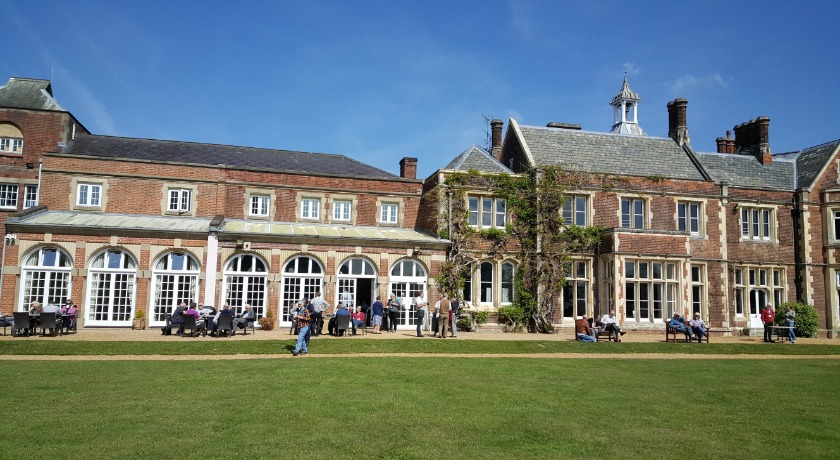 Session nine
Session nine
Worship and Bible study
The last day of Mission Council’s business began with worship led by the Revd David Coaker, Chaplain to the Moderator of General Assembly.
The Revd Neil Thorogood spoke to Mission Council on the parable of the prodigal son, illustrated by Sieger Köder’s painting of the story, ‘Home’. He invited representatives to consider their own experience of lostness, the way that being found means waking up to something better, and our liability – like the elder brother – to become lost again.
Mr Thorogood said that Jesus enacts the story by gathering into God’s self everything that overcomes us. God is ‘more merciful than seems possible and more welcoming than seems prudent’. He then invited members of Mission Council to consider what sort of churches we need to be to embody the abundant gifts of God.
Paper M3: Acting with strategic intent
Resolution 4.3 had been withdrawn and a revised resolution was reintroduced with the following wording:
Mission Council, acting on behalf of the General Assembly, expresses its desire to explore in more details possible central provision of support services, and therefore directs the General Secretariat to initiate consultation with synods, and to report back on any themes or concerns that emerge.
The resolution was passed with consensus.
Paper T1: Ministerial incapacity advisory group proposal for work on a redrawn ministerial disciplinary process
This paper presented the case for a new process in dealing with disciplinary cases involving Ministers and Church Related Community Workers. The Revd John Durell, who presented the paper, asked Mission Council to approve the preparation of a new process, which will be reported back on at Mission Council in 2020. He also sought approval that scrutiny groups, set up by the ministerial incapacity and discipline advisory group (MIND), should consist of members from MIND and others as well as members of Mission Council, and those Council members who wanted to volunteer their time.
The resolutions passed by consensus.
Paper N1: General Assembly task group – moderators, clerks and councils
Val Morrison, the convener of the General Assembly Task Group introduced the report, which looked at the General Assembly from 2020-2030.
The report focussed on several pieces of work: the number, tenure and duties of the Moderator of General Assembly; the frequency of the Mission Council, considering the return to the URC holding its General Assembly annually; the name of the Mission Council along with some other issues relating to it; the future of the Mission Council Advisory Group and the Assembly Arrangements Committee; and the succession of the Clerk to the General Assembly.
Breaking into groups to discuss the different options from the task group, followed by time in plenary sessions, the Mission Council decided the following.
It affirmed the vision, nature, scope and responsibilities of the Moderator of General Assembly. The task group recognised that an election to the role is a call from the church to give leadership, both inspirationally and in the chair of the General Assembly and the Mission Council.
The paper listed the number of essential tasks for a Moderator of General Assembly, including the General Assembly, Mission Council, Business Committee (see below), representing the URC on Remembrance Sunday and visiting local churches, numbering eight weekdays and 17 weekend days.
It also listed desirable tasks such as international visits, committee meetings and the meeting of the URC Trust, the general assemblies of partner churches and visits to the Resource Centres for Learning.
Mission Council also agreed that the Moderator of General Assembly will serve for one year, and Synods can nominate the names of a minister and an elder each year for consideration.
With the return to an annual General Assembly, the Mission Council shall now:
- meet for one 48-hour meeting at a time and venue to be determined
- initiated the process of changing its name from Mission Council to Assembly Executive
- agreed that each Synod will now send four representatives with an option that the moderator of the synod can be one of them
After next year’s General Assembly, the assembly arrangements committee and the Mission Council Advisory Group will be discharged and abolished, and a new standing committee of the assembly, known as the Business Committee, shall be established to address logistical questions, supervise practical arrangements for the assembly and the Mission Council and advise the Moderator of the General Assembly on their official duties.
The Standing Orders of the General Assembly were amended to include another reason not to move a motion or amendment when it ‘simply affirms existing work’.
Having reviewed the workload of the Clerk of the General Assembly and the General Secretary, being mindful of the transition between postholders, along with a shrinking number of volunteers for the role of the Clerk, Mission Council asked the Nominations Committee to seek an Assistant Clerk, who would serve in the first instance for three years from 2020.
An Assistant Clerk would offer clearer demarcation than a job share, the report from the task group said, and could give people experience of the role to help create a pool of potential successors.
The term of the Revd Michael Hopkins, the current Clerk, ends after General Assembly 2024. The current rules of the URC allows for an initial term of six years followed by a further term of up to four years.
Work on the role description for the Assistant Clerk will now take place.
Mission Council Advisory Group
Invitations were invited for the vacancies on the Mission Council Advisory Group (MCAG). The Revd Adrian Bulley, Synod of Wales Synod Clerk, was elected (see report on Paper N1).
 Conclusion
Conclusion
At the end of the day’s business Derek Estill, Moderator of the General Assembly, and the Revd John Proctor, General Secretary of the URC, thanked Mission Council and all the people behind the scenes for helping to put the event together.
Reporting: Ann-Marie Abbasah, Steve Tomkins and Andy Jackson from the URC Communications Team.




